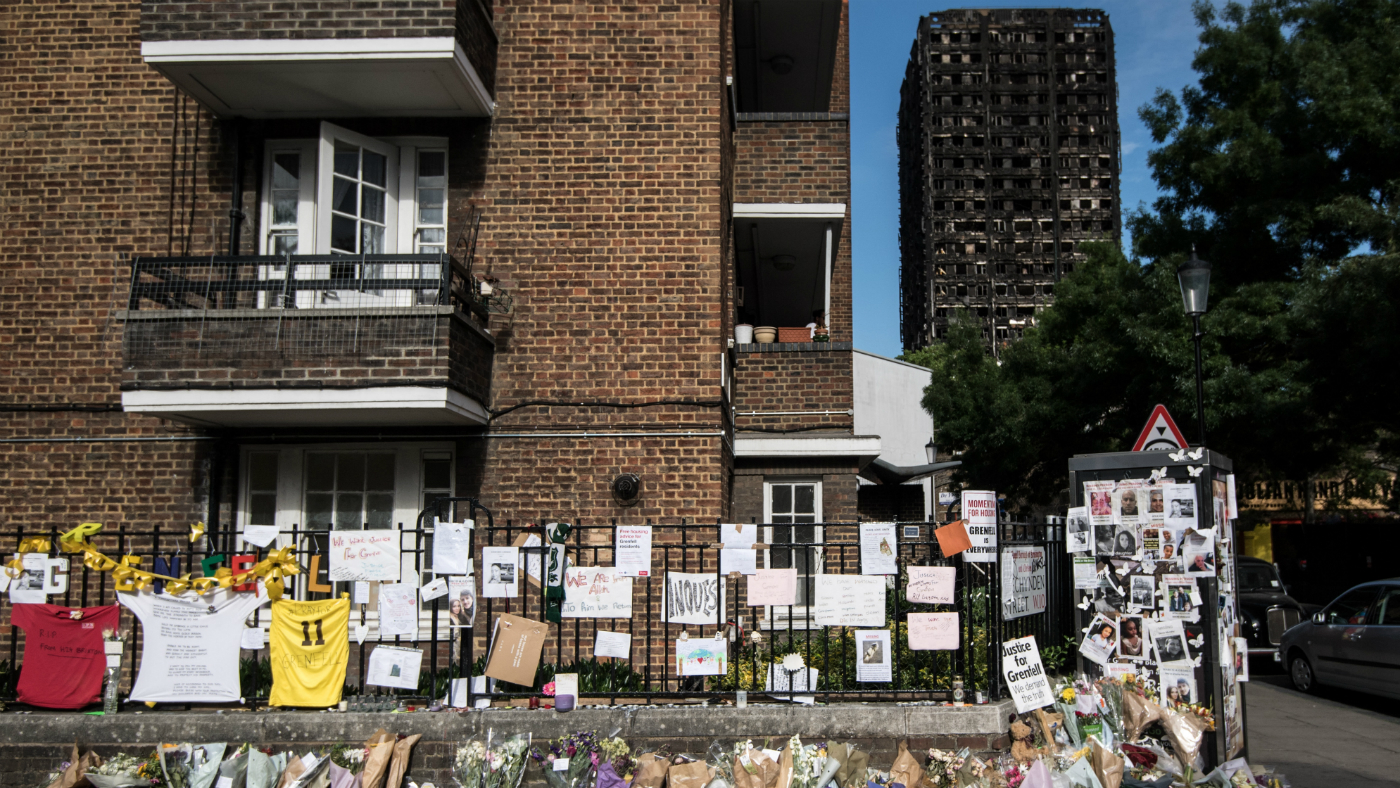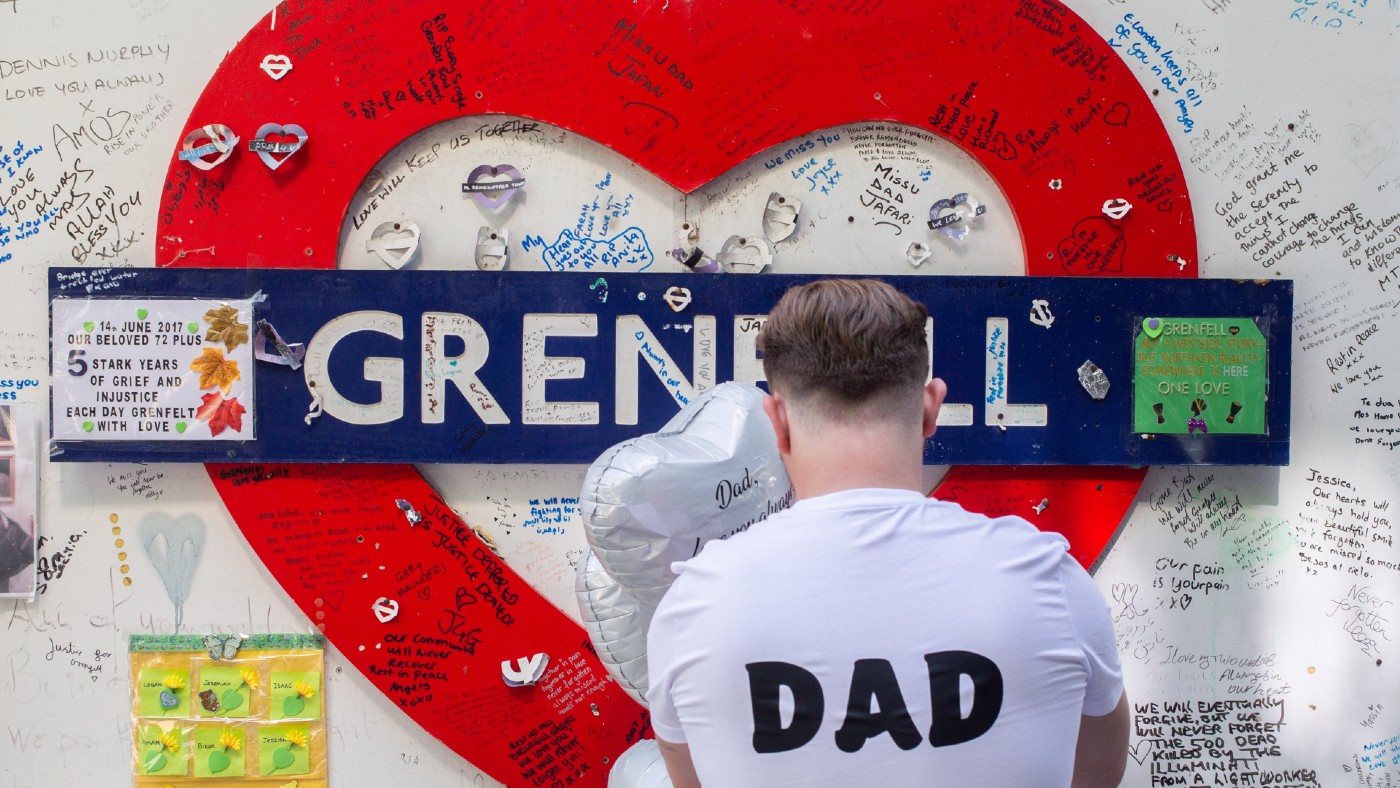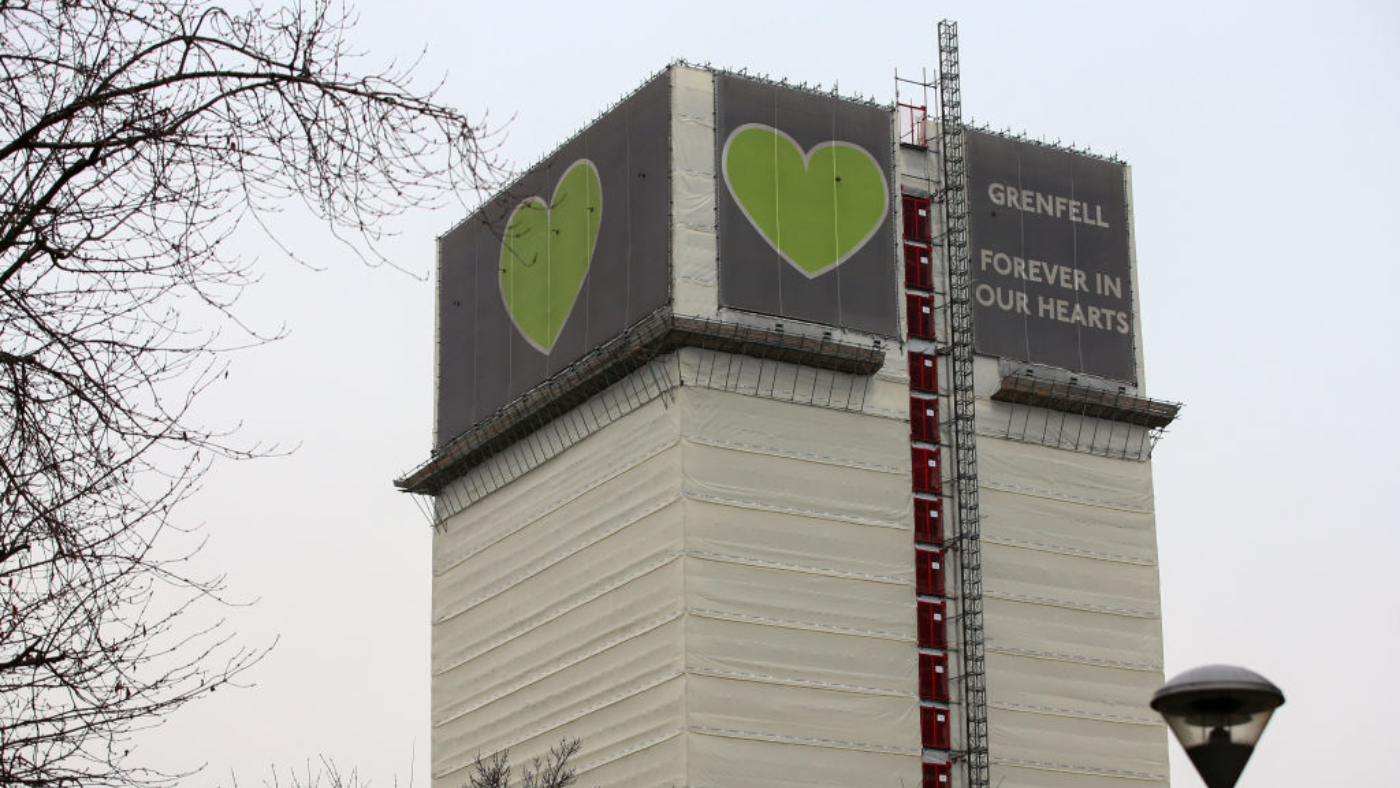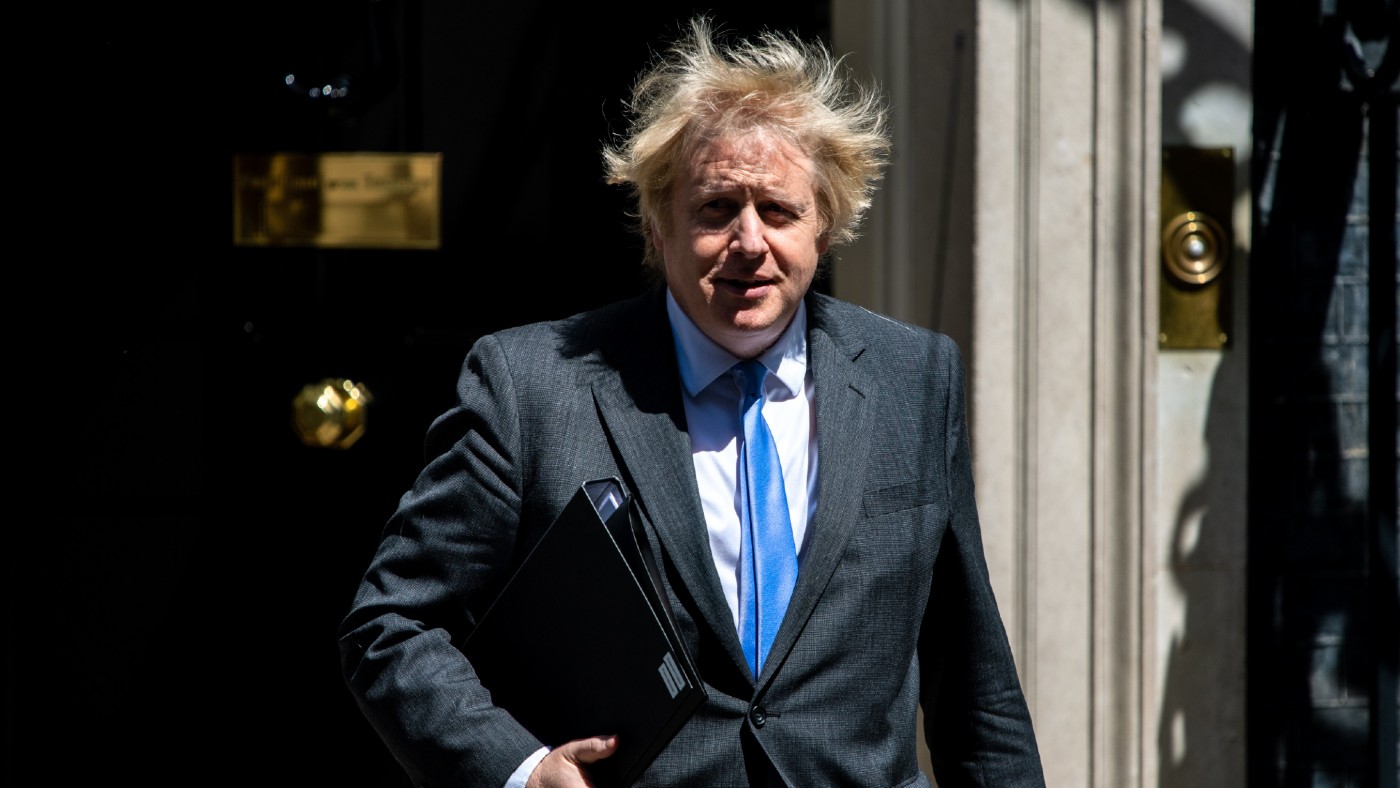'Twenty suicide attempts' since Grenfell Tower fire
Volunteers say council is not doing enough to help traumatised survivors

A free daily email with the biggest news stories of the day – and the best features from TheWeek.com
You are now subscribed
Your newsletter sign-up was successful
Grenfell Tower: Taskforce takes over key Kensington services
5 July
A taskforce has been appointed to manage key services at Kensington and Chelsea council, reports The Independent.
Communities Secretary Sajid Javid will announce that a team of outside experts will be manage the likes of housing, regeneration, community engagement and governance services following criticism over the council's handling of the tragedy.
The Week
Escape your echo chamber. Get the facts behind the news, plus analysis from multiple perspectives.

Sign up for The Week's Free Newsletters
From our morning news briefing to a weekly Good News Newsletter, get the best of The Week delivered directly to your inbox.
From our morning news briefing to a weekly Good News Newsletter, get the best of The Week delivered directly to your inbox.
The move will be confirmed in a written statement to MPs, says The Guardian, which adds the taskforce "is expected to be phased in as the current Grenfell Tower response team is gradually wound down". Both the council leader and chief executive have resigned in the aftermath of the 14 June fire.
Eleanor Kelly, spokeswoman for the Grenfell Response Team, welcomed the news, telling BBC Radio London: "We can't stay in a crisis mode for an extended period of time because everybody needs to actually feel that things have gone back to a level of stability."
At least 80 people are believed to have died in the fire, although the exact number won’t be known for months because of the extent of the damage.
The coroner leading the inquest into the blaze yesterday told survivors the scene at Grenfell was "apocalyptic" during an angry meeting at the Olympia conference centre in West Kensington.
A free daily email with the biggest news stories of the day – and the best features from TheWeek.com
Nabil Choucair, who fears he lost six members of his family, told the BBC: "We personally asked, 'Where is our family?' We want to know: are our family's bodies still there and is there anything from them?
"Whatever it is, we want to know exactly what it is, do not hide anything. But the answers that were coming back were, 'We don't know. We don't know. We don't know.'"
Controversial judge to head Grenfell Tower inquiry
29 June
Sir Martin Moore-Bick, a retired appeals court judge, has been appointed to head the inquiry into the Grenfell Tower fire, in which at least 80 people died.
He promised it would be "a vigorous inquiry that gets to the truth" and said he understood the "desire of local people for justice", but warned the scope of his report would be limited.
He also said he aimed to produce an interim report within a year and would focus on the start and rapid development of the fire, along with recommendations on how to prevent similar disasters.
"I'm well aware the residents and the local people want a much broader investigation and I can fully understand why they would want that - whether my inquiry is the right way in which to achieve that I'm more doubtful," he told the Daily Telegraph.
Moore-Bick has been praised in the past for his rulings, with justice minister Dominic Raab saying he had applied "long awaited common sense" to human rights law.
However, some of his decisions involving housing have been viewed as controversial.
Among them was his decision to allow Westminster City Council to rehouse a single mother with five children more than 50 miles away in Milton Keynes. The decision was overturned by the Supreme Court, The Guardian reports.
Nevertheless, he is widely respected in the legal profession, adds the paper, although he will have to gain the confidence of the north Kensington community around Grenfell, some of whom he met today.
Educated at Christ's College, Cambridge, Moore-Bick spent decades as a judge of the commercial court and the court of appeal. His main work involved contracts, insurance and banking.
Theresa May says Grenfell residents will be given a say over the direction of the investigation and state funding will be provided for legal representation at the inquiry.
Meanwhile, the Metropolitan Police announced yesterday it may not have a final death toll from the blaze until the end of this year.
Detective Superintendent Fiona McCormack said: "There are 23 flats that, despite huge investigative efforts, we have been unable to trace anyone that lives there.
"At this stage we must presume that no one in those flats survived, that includes anyone who lived there or was visiting them."
More than 60 organisations have now been identified as being involved in the tower's refurbishment, which may have helped the blaze spread, the London Evening Standard reports.
Councils split on how to deal with cladding
27 June
Theresa May has announced a major national investigation into the use of cladding on tower blocks after the government announced that every single sample submitted for safety checks in the wake of the Grenfell Tower disaster failed to pass fire safety tests.
Ministers said that 95 high-rises in 32 councils had so far been deemed to be at risk - a 100 per cent failure rate, reports ITV.
According to The Guardian, samples from schools and hospitals have also been requested but it is unclear whether any have been tested.
It is believed all the tests so far have involved owned by local authority high-rises rather than private buildings, the paper adds.
However, councillors are unsure how to proceed.
On Friday night, Camden council in north London ordered thousands of residents of the Chalcots Estate to leave their flats after fire inspectors found the tower blocks contained combustible cladding.
The scene was chaotic. Reuters describes "residents clutch[ing] children, pets and small amounts of clothing and food [as they tried] to find a bed in a local hotel or with family or friends", adding that "many were directed to inflatable beds laid out on the floor of the local sports hall.
Camden council said yesterday that 14 people were still staying at a nearby leisure centre while the majority of residents were housed in temporary accommodation.
However, according to the Guardian, more than 100 people have refused to leave their homes and have criticised the council for not offering livable alternatives.
Resident Mandy Ryan, who lives with her disabled son, says she was offered a flat with a broken boiler and a faulty cooker, the i newspaper reports.
"We are not the villains here, we are the victims," she said. "We are not trying to impede any work whatsoever, we just want suitable accommodation. We are all scared, we are disrupted, we don't know how we are going to cope, cook, wash or anything at the moment."
Camden council leader Georgia Gould said residents who refused to leave risked "delaying the work that is required… to make these homes safe".
Coaxing unwilling residents to vacate their homes is the council's preferred strategy, says Sky, but the i warns officials could take legal action against those who refuse to leave as a last resort.
Other residents have told the Daily Mail they are being intimidated by security guards into leaving against their will.
Other local authorities have taken a different tact.
Evenlode and Windrush Towers in Oxford says there it has no plans to re-house residents living in towers where the cladding has been deemed a danger, reports the Oxford Mail.
Bob Price, head of Oxford City Council, said such a move was "not necessary" while they replace the material.
However, residents were reportedly "aghast at [this] news", with one telling the paper: "I'm not going to be able to sleep at night."
Survivors of the Grenfell Tower disaster, meanwhile, have been promised temporary social housing in Kensington Row, a £2bn luxury apartment block currently under construction, reports the London Evening Standard.
This follows intense criticism of the relief effort of Kensington and Chelsea - a precursor to the criticism now emerging as local authorities pursue distinct and uncoordinated responses to safety concerns.
Grenfell Tower fire: Police consider manslaughter charges
23 June
Police are looking into the possibility of manslaughter charges as part of the investigation into the Grenfell Tower fire in west London as councils rush to remove flammable cladding on buildings across the UK.
Detective Superintendent Fiona McCormack said that officers had established that the fire wasn't started deliberately. The initial cause was a faulty Hotpoint fridge-freezer that wasn't subject to a recall.
McCormack added that the authorities were trying to get to the bottom of why the fire spread so rapidly.
Hotpoint issued a safety notice today urging customers with model numbers FF175BP or FF175BG to call or register their details.
Manslaughter charges are among a string of offences being considered by police as part of the investigation.
Documents and materials have been seized from a "number of organisations", McCormack added.
Combustible cladding is suspected to have aided the "rapid and unprecedented" spread of the fire.
Sam Webb, an architect who investigated 2009's deadly Lakanal House fire in south-east London, told the Architect's Journal that similar aluminium composite material (ACM) cladding has been found to be flammable elsewhere. The material has been linked to fires in Australia, Russia and the United Arab Emirates.
In addition to the cladding, insulation recovered from Grenfell Tower has also been tested. Both failed the safety tests, with the insulation proving "more flammable than the cladding," says The Times.
Police say the number of people presumed dead remains at 79 but the number could rise.
Council fears
The news comes as thousands of tower block residents around the UK were warned that their homes may be clad with the same ACM panels believed to have fuelled the blaze.
Downing Street says it has identified 11 tower blocks across eight local authority areas with similar ACM cladding to the one used on Grenfell Tower. In total about 600 towers across the UK are having their cladding tested.
The revelation came as Camden council began urgently removing cladding from some of its buildings after laboratory tests revealed they contained the same flammable material as the one used on Grenfell Tower.
The council said it would take "urgent legal advice" after the panels it ordered for the blocks were not fitted as commissioned. It also said it would "immediately begin preparing to remove these external cladding panels from the five tower blocks".
Rydon was the main contractor, but the firm subcontracted the design and installation of the external cladding to Harley Facades, Metro News reports.
Harley's managing director, Ray Bailey, told ITV News: "These works were as described in the contractual specification and approved in the usual process for construction and building control by the London Borough of Camden."
"There is no evidence to suggest that this product and cladding system installed in Camden is unsafe."
Islington Council has also confirmed that cladding is to be removed from Braithwaite House, a high-rise block within the borough, after tests revealed the presence of ACM.
Private sector concern
The government has encouraged private landlords to send in samples for testing but they are under no obligation to do so, "raising concerns for those renting in the private sector," says The Independent.
The UK’s largest hotel group, Premier Inn, has announced that three of its properties in Maidenhead, Brentford and Tottenham will be investigated as they "have concerns that the fire-retardant cladding used may not adhere to recognised government guidance."
Downing Street says the 600 buildings identified yesterday for testing are all local authority-owned buildings. Local authorities are also examining schools and hospitals, The Guardian reports citing a Downing Street spokeswoman.
But No 10 also says building regulations will be examined to see if the standards were high enough in light of the Grenfell fire.
"In terms of regulations, we are going to have to reflect on issues that have been thrown up on building regulations and I'm sure there will be recommendations and issues raised throughout the inquiry that [the] government will have to immediately look at to make sure the regulations are much clearer if that is proved to be an issue," the Guardian says.
Grenfell Tower fire: 'Combustible' cladding found in three new tower blocks
22 June
Theresa May revealed today that urgent tests on tower blocks following the Grenfell Tower blaze had revealed "combustible" cladding on a "number" of buildings.
Speaking to MPs in the Commons, the Prime Minister said initial results had shown other blocks had seemingly used flammable cladding, reports The Guardian.
A No 10 spokeswoman later said three samples had been found to be combustible.
She added it would be "irresponsible" to reveal the exact locations of the tower blocks at risk as residents were still being informed and authorities were working to ensure their safety. All three buildings are in England.
The spokeswoman said: "In terms of how many buildings and how many homes have this type of cladding, the estimate provided to us by councils is that there are approximately 600 high-rise buildings with similar cladding. We are in touch with all the local authorities to encourage them to urgently send us the samples and then we will carry out the checks that we need to see where we are with that."
The Daily Telegraph adds that she said that "obviously nobody will be living in buildings that are unsafe" and that residents "will be rehoused if they need to be".
The exact scale of the problem is unknown. While the Financial Times said the government was testing "thousands" of buildings to see if they had cladding similar to that used on Grenfell, the Guardian and others reported that tests were being carried out on 600 high-rise buildings.
The No 10 spokeswoman said the Department for Communities and Local Government was coordinating the process and facilities to allow for 100 samples a day to be tested.
The government is also making its cladding checking facilities available to private landlords for free, raising the prospect that many more residents will be affected.
The news follows the resignation of Nicholas Holgate, the chief executive of Kensington and Chelsea council, who says he was asked to step down by Communities Secretary Sajid Javid following the Grenfell Tower blaze.
He added he would have liked to have stayed on, but felt it necessary to resign. "There is a huge amount still to do for the victims of the fire requiring the full attention of this council and many others," he said.
"If I stayed in post, my presence would be a distraction."
"His resignation comes after a tide of criticism of the council, not only for the way it responded to the Grenfell Tower tragedy but also for historical neglect of poorer residents of the borough and a neglect of social housing," The Guardian says.
Yesterday, the Communities Secretary announced that survivors of the Grenfell Tower fire would be rehoused in 68 flats within the social housing wing of Kensington Row, a £2bn luxury apartment block currently under construction.
"Two bedroom flats are currently being advertised for up to £2.4 million," says the London Evening Standard, "but it is understood the City of London Corporation paid around £10 million for the flats thanks to an 'extraordinary gesture' of goodwill by developer St Edward in selling the properties at their cost price."
Grenfell Tower: Families only given £200,000 from £5m fund
20 June
A total of £202,000 in government aid has been paid out to 180 families directly affected by the Grenfell Tower fire, says the Grenfell Response Team set up to manage the official response to the tragedy.
Householders have received payments of £500 in cash and £5,000 in bank deposits, but the money is only a fraction of the £5m government fund.
The delays can partly be explained by the confusion over how to distribute the money. Volunteer Nisha Parti told ITV survivors were getting just £10 from the local council days after the fire, reports the London Evening Standard.
Parti added: "There is money pouring in from all these amazing volunteers. We can't get access to the money and we cannot get it to the families."
However, The Independent reported that some undocumented migrants affected by the blaze may not be seeking state support due to fears over their immigration status. The paper says they are "are afraid to seek help from authorities for fears that they could be referred onto police or the Home Office".
Mike Adamson, chief executive of the British Red Cross, told The Guardian the charity had increased its involvement amid concerns that some victims were unregistered asylum seekers.
"Our refugee services are working to find anyone who is undocumented and worried to present to the authorities," he said.
Grenfell Tower fire: Deaths expected to rise to 79
19 June
The number of people dead or presumed dead in the Grenfell Tower fire in west London has increased to 79, the Metropolitan Police said this morning.
The figure doesn't include the 18 people who remain in hospital nine of whom are in a critical condition, the BBC reports.
Identifying the victims will take several weeks due to the "indescribable" conditions within the tower, Commander Stuart Cundy told the BBC.
According to Cundy, the "terrible reality" is that some people's remains may never be identified because of the intensity of the fire.
"There is also a real possibility that there may be people in the building that no one knows are missing," he added.
The fire swept through the 24-storey Grenfell Tower estate in North Kensington on 13 June. Many of the families affected lost more than one relative in the fire, Cundy told the BBC. Some of the identified victims include a family of five – Abdul Aziz El-Wahabi, his wife Fouzia and their three children ages 21, 16 and eight – all of whom are presumed dead, Sky News reports.
"This is an incredibly distressing time for families," said Cundy. "It is really hard to describe the devastation the fire caused. What is important for me is to find answers for those families who have been directly affected."
The investigation into the missing people and how the fire began will be "wide-ranging" and will delve into the construction of the building, the recent renovations to its cladding and its fire safety measures, among other things.
Several government bodies have been criticised for their mishandling of the building and the fire's aftermath. Many Londoners have expressed anger towards the Kensington and Chelsea Council, which manages the estate. Critics include London Mayor Sadiq Khan, who said last week that the fire was a "preventable accident" caused by "years of neglect" by the council, according to BT.
Cundy said he would like to "reassure everybody" that he will be looking into all the criminal offences that could have allowed the fire to happen, whether by an individual or an organisation.
"Where offences have been committed, I will do everything in my gift to make sure they [the perpetrators] are brought to justice," he added.
Grenfell Tower: fireproof cladding 'would have cost just £5,000 more'
16 June
Cladding used in the refurbishment of Grenfell Tower in North Kensington could have been replaced with a fire-retardant version for just £5,000, The Times reports.
The aluminium cladding has a polyethylene core, which in the US is banned on buildings more than 40ft high, or about four storeys tall. Grenfell Tower has 24 storeys.
The UK Building Research Establishment "warned last year that the drive for greater energy efficiency meant more and more buildings are being wrapped in materials that could go up in flames", The Guardian says.
A "rough calculation" by The Times suggests that a little over 2,000 square metres of the panelling, made by a company called Reynobond, was used on Grenfell Tower. The same company's fire-resistant panel sells for £24 per square metre – £2 more than the standard version. Therefore, the newspaper said, Grenfell could have been clad in the fire-resistant material for less than £5,000 more.
The confirmed death toll from the fire now stands at 30, but the BBC says 76 people are believed to be missing.
-
 The 8 best TV shows of the 1960s
The 8 best TV shows of the 1960sThe standout shows of this decade take viewers from outer space to the Wild West
-
 Microdramas are booming
Microdramas are boomingUnder the radar Scroll to watch a whole movie
-
 The Olympic timekeepers keeping the Games on track
The Olympic timekeepers keeping the Games on trackUnder the Radar Swiss watchmaking giant Omega has been at the finish line of every Olympic Games for nearly 100 years
-
 What next after the four-year Grenfell fire inquiry ends?
What next after the four-year Grenfell fire inquiry ends?feature Final ruling not expected until next year when police will decide on criminal charges
-
 ‘The trauma of the Grenfell bereaved is made worse by a lack of finality’
‘The trauma of the Grenfell bereaved is made worse by a lack of finality’Instant Opinion Your digest of analysis from the British and international press
-
 Home Office worker accused of spiking mistress’s drink with abortion drug
Home Office worker accused of spiking mistress’s drink with abortion drugSpeed Read Darren Burke had failed to convince his girlfriend to terminate pregnancy
-
 ‘The Tories will stick with the devil they know’
‘The Tories will stick with the devil they know’Instant Opinion Your digest of analysis from the British and international press
-
 In hock to Moscow: exploring Germany’s woeful energy policy
In hock to Moscow: exploring Germany’s woeful energy policySpeed Read Don’t expect Berlin to wean itself off Russian gas any time soon
-
 Were Covid restrictions dropped too soon?
Were Covid restrictions dropped too soon?Speed Read ‘Living with Covid’ is already proving problematic – just look at the travel chaos this week
-
 Inclusive Britain: a new strategy for tackling racism in the UK
Inclusive Britain: a new strategy for tackling racism in the UKSpeed Read Government has revealed action plan setting out 74 steps that ministers will take
-
 Sandy Hook families vs. Remington: a small victory over the gunmakers
Sandy Hook families vs. Remington: a small victory over the gunmakersSpeed Read Last week the families settled a lawsuit for $73m against the manufacturer